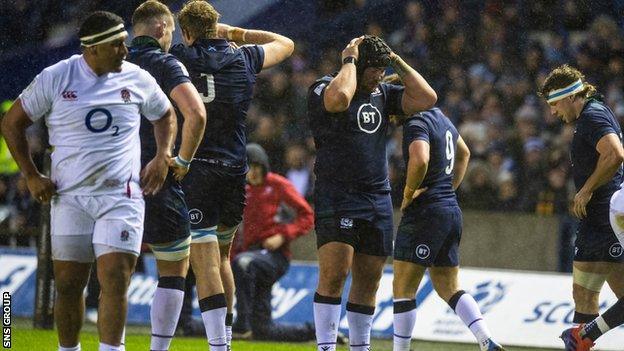Six Nations: 'Scotland add belligerence but are burdened by wastefulness'
- Published

Once again, Scotland had chances but could not convert pressure into tries at a sodden Murrayfield
The good news is that in this Six Nations championship high on Scottish try-scoring opportunities but devoid of actual Scottish tries they now go to a place where they have a recent track record of crossing the white line - Rome.
The bad news came on Sunday in a double dose when Finn Russell dynamited the hope of a return to Test rugby any time soon, and angered team-mates into the bargain, then later, when Italy followed up a wretched loss to Wales with a spirited performance in Paris.
It was yet another loss, but one with all sorts of encouraging things contained within. Encouraging for Italians, that is. Not for Scots.
Scotland have played in Rome 10 times in the Six Nations, winning five and losing five. Of their victories, two of them put the heart sideways in their support, a win in 2006 that was only achieved courtesy of a 78th-minute Chris Paterson penalty, another in 2014 that came via Duncan Weir's 79th-minute drop goal and a third in 2018 that was deeply fortunate and only possible because Greig Laidlaw kept his nerve and banged over the winning kick with one minute left on the clock.
In 10 visits, Scotland have had it easy in Rome on just two occasions. Once more, the Scots are targeting Italy for a morale-boosting victory and Italy are looking at Scotland for a breakthrough win. In the big Six Nations picture, where the title chase is happening elsewhere, it's the rugby equivalent of Dwayne Johnson and Vin Diesel fighting over a comb.
It's where we are, though. Again. The DVDs of Scotland in recent seasons are beginning to look like relics from another age, an era when they created chances and actually converted some of them.
The lightning thrusts of Stuart Hogg, the dummy runners, the trickery and deception, the pace, the hands, the clinical nature of some what they did in the final season of Vern Cotter and the first season of Gregor Townsend. They didn't win nearly enough games, but their best moments within those games revealed a side with all sorts of elan, all of it orchestrated by the brilliance of the dearly departed Russell (2014-2019).
You look now at some of their scores against Ireland and Wales in 2017 under Cotter and his attack coach Jason O'Halloran as well as the best of Townsend's work (the win over Australia in Sydney, the epic victory over England at Murrayfield and the second-half comeback at Twickenham) and wonder what's gone wrong.
They delivered such exciting rugby and had an end product. On their best form, they could scythe teams open with moves that started in their own 22 and finished under the opposition posts. That kind of edge has been missing for a little while. Not just at Murrayfield in the biblical conditions of Saturday, but also in Dublin the week before, in Yokohama against Japan and Yokohama again against Ireland, against Wales and Ireland in Murrayfield in last year's championship.
It would help if Russell was still around but, equally, it's too simplistic to say that Scotland would have found ways of executing against Ireland and would have triumphed over the monsoon against England had he been wearing 10. He was wearing 10 in a lot of those other misfires after all.
Six Nations highlights: Scotland 6-13 England
We can lament the demise of Scotland's finishing but at the same time in this deeply curious beginning to the championship we can welcome the arrival of a more belligerent crew. Those tries from previous seasons were great, but for every one we could cite two or more blunders that proved costly at the other end. Soft touch scores. Scotland were a dab hand at those, too.
In their first two defeats of the Six Nations what was once Scotland's greatest strength, their finishing, became their greatest weakness and what was previously their greatest weakness, the inability to show the kind of resilience to stay in the hunt, became their greatest strength.
Scotland haven't scored a try in two Tests, but they've conceded only two. Against those same opponents last season they shipped eight tries. They're more dogged, but increasingly wasteful. They're spending more time attacking in the opposition 22 than the opposition is spending in theirs but they've lacked the wit to take advantage.
Ireland, a team that walloped Wales in four-try bonus point win on Saturday, scored one try against Scotland and were limited to precious few chances. In the foulest conditions imaginable, England, the World Cup finalists, were also limited to one golden chance and they had the ruthlessness to take it. Not everything is broken in the Scotland ranks. Amid the gloom of defeat and the misery of the Russell saga, there are nuances to this that have to be taken into account in any analysis.
For sure, Scotland's execution is a problem. Without question, the line-out has gone backwards, although a thought must be spared for the hapless hookers of Saturday having to throw in those conditions. Peter Wright, the darts world champion not our hero of the airwaves, would have struggled to control his arrows in that weather.
Scotland lost the breakdown again. Four English steals on the floor compared to one. Last week, Ireland won six breakdown steals to Scotland's one. Townsend has Hamish Watson and Jamie Ritchie competing for ball, two excellent operators. They've also got Fraser Brown, effectively a third openside in the starting line-up.
They also have one of the great experts on breakdown coaching working in France with Montpellier and in America in the NFL. Richie Gray is an innovator and a proven class act in this department. He should be working with this team. It's bizarre that he's not given that he has so much knowledge to impart.
The show takes a break for a week and then it's back to the grindstone in Rome for a game that Scotland have to win if they are to avoid the kind of reaction that would make the incessant rain and driving wind of Storm Ciara seem like a pleasant day out.
